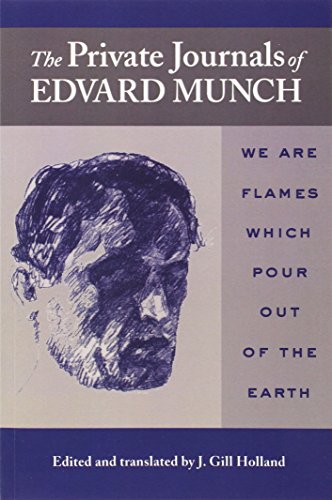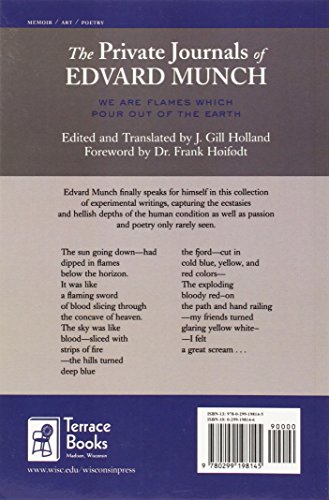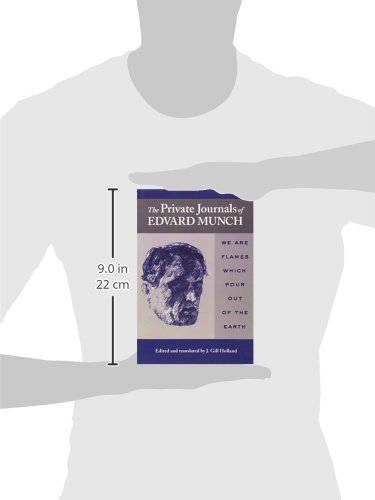Customer Services
Copyright © 2025 Desertcart Holdings Limited




Full description not available
E**Y
Munch's genius in writing
i am so in love with this book... I went to see Munch's 150th anniversary in oslo last month and i was completely taken by his artwork in real life, it is the most powerfully raw art collection i have ever seen. I started noticing this pieces of writings that were kept in glass cabinets and my norwegian friend translated them for me. Of course the depth of the words matched the depth of the paintings all around me. Munch was a tormented soul and as most tormented souls had the gift to strip reality of all unnecessary emotions, straight to its core. His writings as much as his artwork reflect this fully.I warmly advice this book to you, reader. x
L**9
Chaotic piece to read
Boring at times but it gives you an inside about his tormented mind (I guess he was probably afftected by bipolar disorder...) and you will understand also where some of his paintings came from.
T**M
Interesting
I'm fascinated by the life and legacy of Munch. I thought that this book would help me get into some of his process and thinking. Unfortunately, it's a whole lot of disjointed excerpts from journal entries. It doesn't really help the reader understand Munch better. It's a paragraph here, a poem there. I would have liked a more complete journal and hoped this would be that.
J**D
Some Insights Into the Painter's Mind
While reading poetry is not one of my favorite activities, I was drawn to this volume because of my continuing interest in Edvard Munch's paintings and the mind behind them. Therefore the material in the book that interested me most were the insights into the artist's character and his personal reports of some of his own life experiences. It's always useful to have the originator of a piece of art spell out exactly what was going through his mind at the moment he was in the act of creation. Although discussing his tendency to talk the ears off some of his intimates, he was at the same time often silent and preferred working alone. He complained of constantly having beautiful women distract him in his studio by arriving and then standing between him and what he was trying to paint while disrobing in order to steal his valuable work time merely to satisfy their own selfish lust. Most of us would not consider this a problem but more of a gift from heaven, but then we aren't Edvard Munch. There are various types of prose and poetry included in this 200-page translation of selected sections from Munch's fifty years of journal keeping. Some of the material flows as easily as water running down a mountainside and navigating some of it is more like shooting the rapids in pitch darkness. Munch took his personal note keeping very seriously as the title of his journal indicates. "We Are Flames Which Pour Out Of The Earth" is not a title for something the author considered light reading. One-segment details witnessing a butcher slaughter an ox. That's not the kind of bedtime reading most people treasure. In another segment Munch meets Ibsen at one of his exhibitions and explains what he was attempting with some of the paintings about which Ibsen is curious. This happened to be several paintings from his life frieze. Later, he notes that Ibsen uses the meeting and fictionalizes what was discussed in his "When We Dead Awaken." There is something for everyone in this translation. Some of it seems almost as obscure and disturbing as the artist's paintings, but that's okay. The reader will finish the book with some new insights into the artist and his work. Fifteen of Munch's lesser known visual works are also pictured in the book including one of my favorite woodcuts with gouging, "Man's Head beneath Woman's Breast." Another of my personal favorites, "The Brooch, Eva Mudocci" is also reproduced. This is a must-read for anyone who is truly interested in the man who was Edvard Munch, but be prepared to work a little. This doesn't read as easily as Tolstoy, Margaret Mitchell or Stephen King.
S**N
Great insight into the brilliant, tormented mind.
This book reads as a flowing poem, compiled from his private journals. You can tell that the thoughts of life and death and love and pain are cointained in those lines as they are seen in the paintings. It is not a chaptered book with an ultimate purpose as, proven by other reviews, the modernist expects.It is an insight into Munchs mind, which many followers of his work usually feel comfort in.
Trustpilot
2 weeks ago
1 month ago